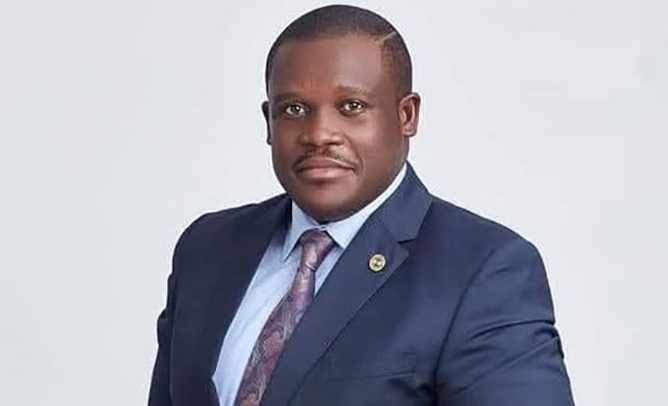Samuel Nartey George
The Minority in Parliament has raised serious concerns over what it describes as a “shady and ill-conceived” plan by the government to merge state-owned AT (formerly AirtelTigo) with Telecel Ghana.
At a press conference in Parliament yesterday, the Minority Caucus on the Information and Communications Committee, led by its Ranking Member and Kpandai Member of Parliament (MP), Matthew Nyindam, accused the Minister for Communication, Digital Technology and Innovation, Samuel Nartey George, of “confusion, incompetence, and lack of transparency” in handling the future of AT.
According to Mr. Nyindam, the minister’s inconsistent pronouncements and policy reversals over the last six months have not only eroded investor confidence but also jeopardised the value of Ghana’s only wholly-owned telecommunications company.
He revealed that after government initially signed a memorandum of understanding with Canadian-based firm Rektron and Afritel for a $150 million capital injection into AT, part of a planned $1 billion investment over five years, the minister abruptly abandoned the deal and began pursuing a merger with Telecel.
“This sudden U-turn defies logic,” Mr. Nyindam said and quizzed, “Why reject a $1 billion investment plan from Rektron and Afritel and instead opt for a $50 million network upgrade from Telecel, a company already saddled with debt and struggling to deliver on its own promises?”
The Minority contended that the proposed consolidation is nothing more than an attempt to “dispose of a national asset to fill private pockets.”
They argued that Telecel, which recently acquired Vodafone Ghana, has failed to deliver on its earlier pledge to invest $500 million and currently owes over $400 million.
Mr. Nyindam also questioned the minister’s motives, pointing to what he called “a troubling relationship” between the minister and Telecel.
The caucus cited Telecel’s recent sponsorship of the Homowo Festival in the minister’s Ningo-Prampram Constituency, the first of its kind, which coincided with the week the merger was announced.
“This raises a legitimate question of conflict of interest,” the Ranking Member stated and asked rhetorically, “Why would a company seeking to acquire a state asset suddenly sponsor the minister’s local festival? The timing and optics are deeply concerning.”
The Minority further accused the minister of using the Attorney General’s office as a cover for his policy indecision after failing to honour financial obligations to American Tower Company (ATC), a key service provider to AT.
They claimed the ministry’s poor handling of the matter has caused AT to lose an estimated GH¢7 million in September alone.
The caucus also rejected the minister’s explanation that the merger is part of a government plan to create a duopoly to rival MTN, arguing that such a policy would weaken market competition and harm consumers.
“It is unacceptable for the government to actively promote a duopoly by merging AT and Telecel,” Mr. Nyindam said.
“AT currently offers the most competitive voice tariffs for low-income Ghanaians. Collapsing it into Telecel will reduce competition, limit consumer options, and destroy jobs,” he added.
The Minority demanded that the government immediately halt any ongoing merger or acquisition processes and submit all related documents, including reports by transactional advisors, KPMG, to Parliament for scrutiny.
They also called for a full investigation into what they described as “the non-transparent and secretive handling” of the transaction and reaffirmed their support for the Rektron-Afritel proposal, which they believe offers a better path to revitalising AT without surrendering it to foreign control.
Mr. Nyindam warned Telecel against participating in any irregular transaction, stating that a future government would “review, reverse, and possibly nullify” any deal found to have breached due process.
“This is not just about a company. It is about safeguarding a strategic national asset that underpins our digital sovereignty and protects thousands of Ghanaian jobs. AT must remain in Ghanaian hands,” he said.
By Ernest Kofi Adu


